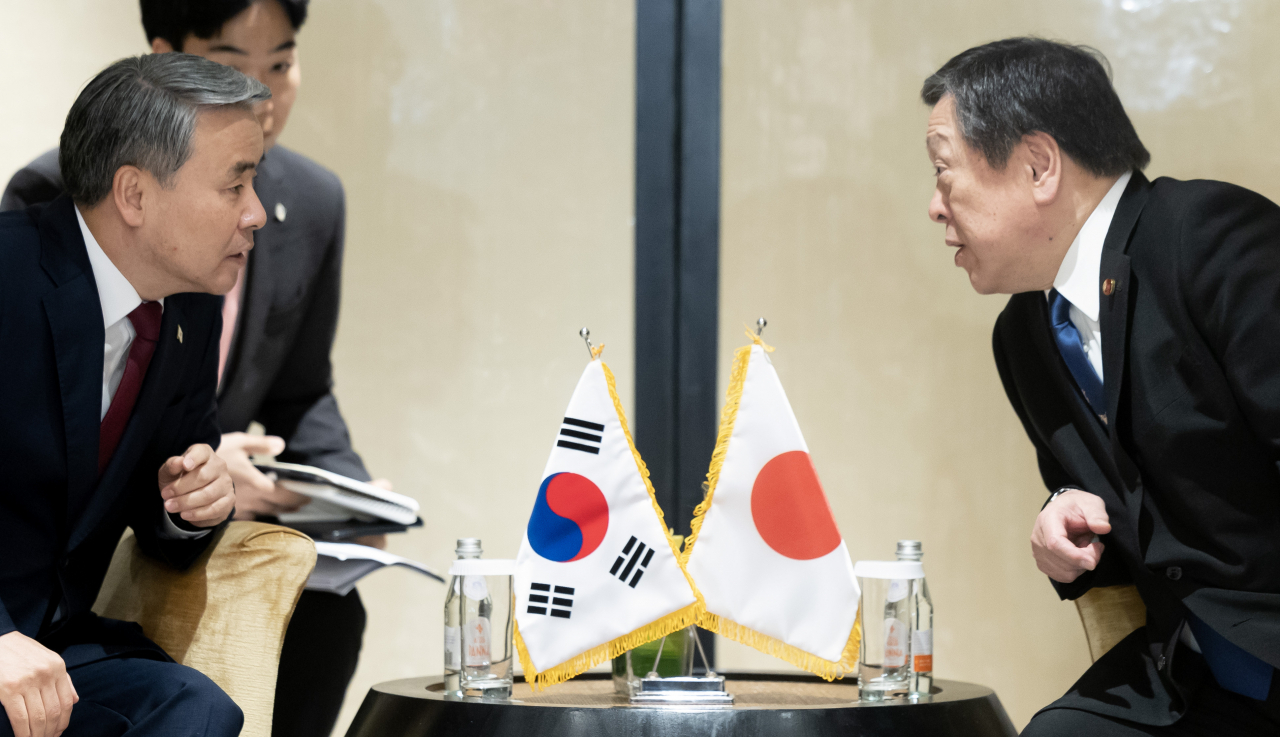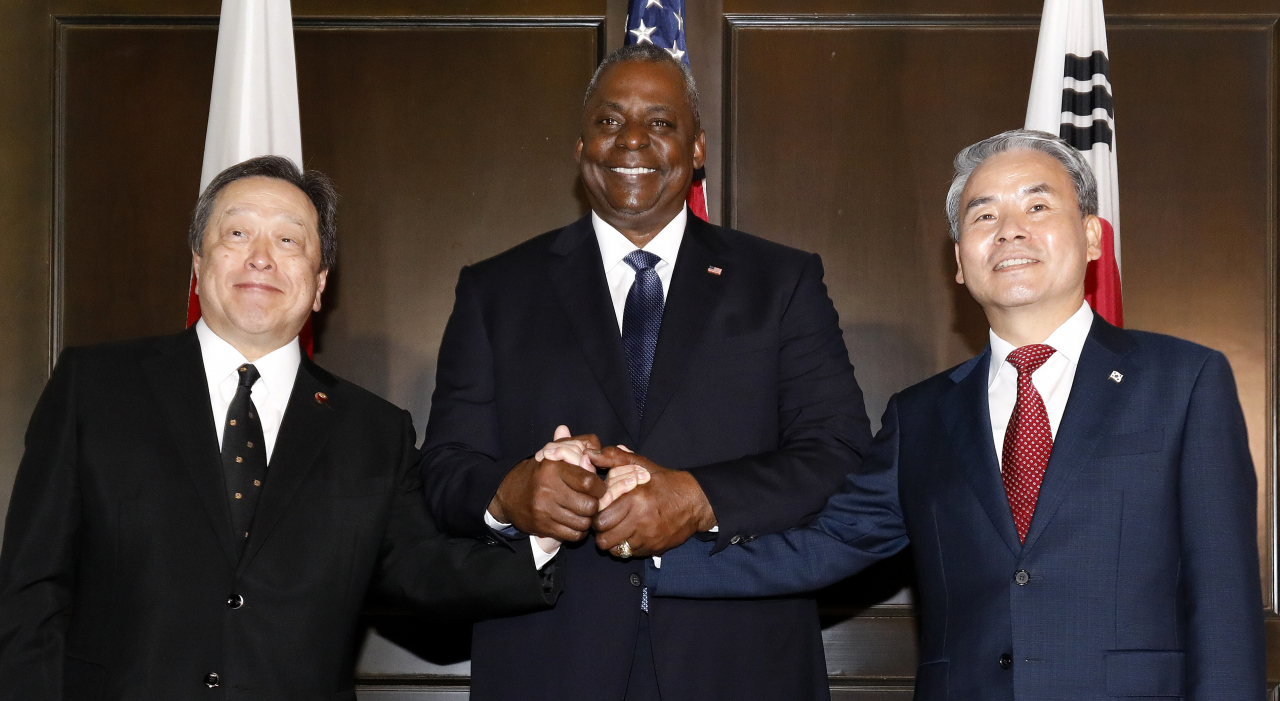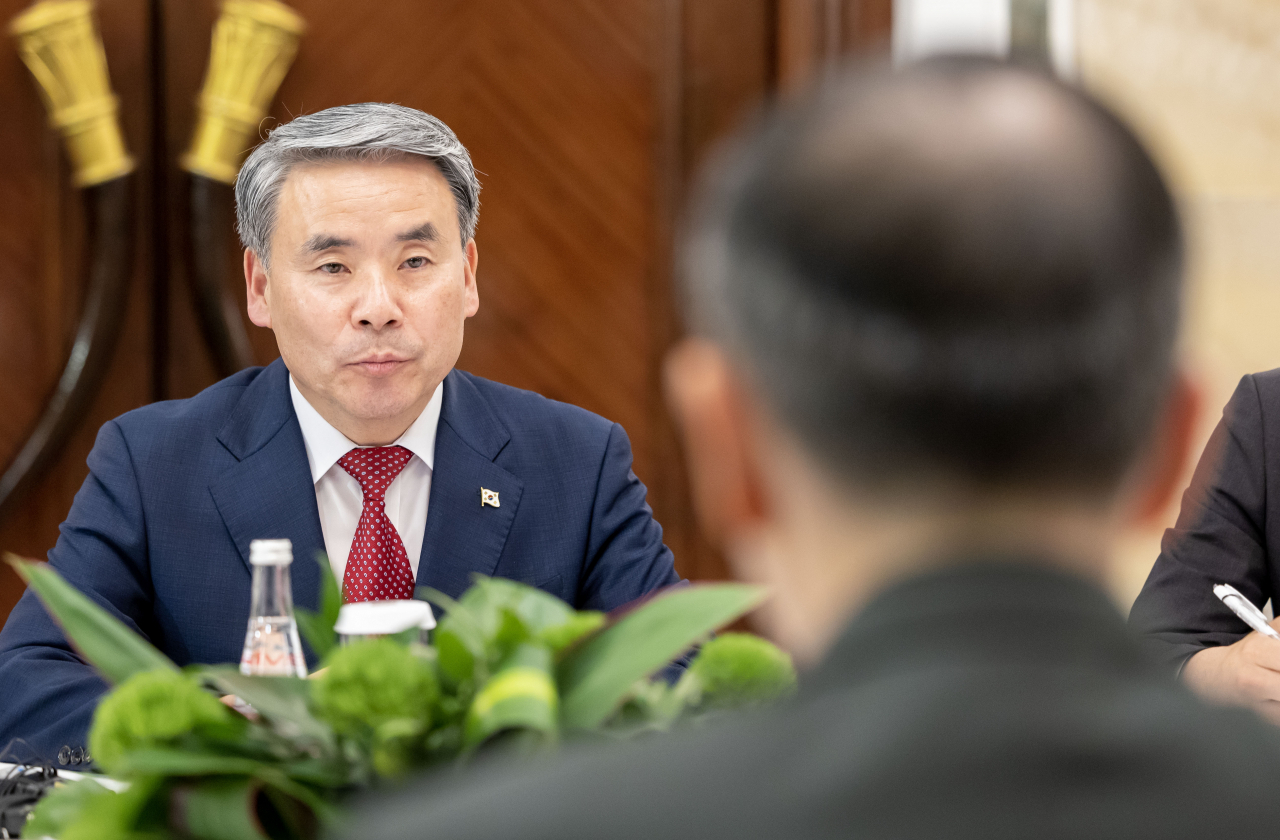S. Korea, Japan agree to bury hatchet on radar dispute, boost data sharing
S. Korea, Japan, US to operate real-time information-sharing system and strengthen military exercises
By Ji Da-gyumPublished : June 4, 2023 - 15:38

SINGAPORE -- The defense leaders of South Korea and Japan have agreed to clear a key obstacle that has hindered their bilateral defense cooperation and exchanges since 2018 and to prioritize their efforts to prevent the recurrence of similar military disputes to foster "future-oriented security cooperation."
South Korean Defense Minister Lee Jong-sup and Japanese Defense Minister Yasukazu Hamada held a 40-minute meeting on Sunday on the sidelines of the Shangri-La Dialogue, Asia's top defense meeting, in Singapore. The bilateral defense ministerial meeting marks the first in 3 1/2 years since November 2019 amid ongoing fence-mending efforts.
Lee and Hamada specifically committed to stop making an issue of the 2018 radar lock-on dispute that resulted in suspending bilateral exchanges between defense authorities, South Korean officials at the Defense Ministry said.
Both sides "agreed to focus on coming up with measures to prevent similar incidents from occurring in the future by holding working-level talks to that end," Lee told reporters after the meeting.
The dispute began as Japan first accused South Korea's Gwanggaeto the Great destroyer of directing its fire-control radar at a Japanese maritime patrol aircraft in 2018. However, Seoul rejected the claim and clarified that the destroyer was engaged in a humanitarian operation to search and rescue a North Korean ship drifting into international waters in the East Sea.
Tracking radar, which measures the direction, distance and altitude of a target to strike it from a warship, is considered an aggressive act of preparing for an attack when it is aimed at an opponent.
The South Korean military claimed that the Japanese surveillance aircraft repeatedly conducted low-altitude flights that were perceived as threatening toward South Korean warships in December 2018 and January 2019.
Since then, Seoul and Tokyo has maintained their respective positions and put the blame on each other regarding the dispute, despite continuing top-down diplomatic efforts to mend ties. Stances of both parties remain consistent at the current moment.
But the Defense Ministry on Sunday defended the decision made by the defense ministers, when asked about potential criticism, that both sides have chosen to bury the problem rather than resolve it.
"The issue has been raised as a sensitive matter in the defense field. Both sides of South Korea and Japan shared a common understanding that if there is no progress in addressing the issue, it will limit advances in overall defense cooperation," a senior official, who wished to remain anonymous, said during a closed-door briefing.
"Both sides recognized that this issue cannot be resolved by solely categorizing it as a matter of right or wrong," the official said. Additionally, they "shared the view that adhering to the existing way of discussion would not lead to desirable results."
Future-oriented security cooperation
Lee and Hamada agreed to make headway in line with the commitment of South Korean President Yoon Suk Yeol and Prime Minister Fumio Kishida to forge "future-oriented" bilateral relations, the official explained.
Seoul and Tokyo will discuss ways to "restore their defense cooperation and exchanges to the level that existed before 2018," the official added.
"The defense authorities of both countries are committed to closely communicating to enhance security cooperation, as the South Korean and Japanese leaders confirmed that the normalization of bilateral relations are on track and agreed to further advance the relationship to a higher level," South Korea's Defense Ministry said in a written statement.
"Both sides also shared the view that it is crucial for South Korean and Japanese defense authorities to further advance security cooperation between South Korea and Japan and among South Korea, the US and Japan, to build confidence and to enhance exchanges and cooperation at various levels to deter and counter the nuclear and missile threats posed by North Korea," it added.
With increasing missile and nuclear threats from North Korea, South Korea and Japan have chosen to put the past behind them and strengthen their security cooperation with a future-oriented approach.
The meeting notably comes days after North Korea's launch of what South Korea and Japan considered a long-range ballistic missile under the disguise of a spy satellite, despite repeated warnings from the international community. The launch sparked air raid sirens and alerts calling for evacuations in both South Korea and Japan.
The ministry underscored that South Korean and Japanese defense authorities will improve communication to enhance "future-oriented security cooperation" at bilateral and trilateral levels.

Upgrade trilateral cooperation
Lee, Hamada and US Defense Secretary Lloyd Austin also met on Saturday and agreed to upgrade trilateral security cooperation by strengthening information-sharing links and military exercises. The meeting marks the first defense ministerial meeting between the three countries since June 2022, which was also held at the Shangri-La Dialogue.
The photo of the three defense chiefs clearly demonstrates how trilateral cooperation has rapidly evolved. In last year's group photo, the defense chiefs were seen standing at a distance from each other. However, this year, all three were seen symbolically holding hands, with Austin standing in the middle.
The three leaders notably agreed to establish and operate a system to share North Korea's missile warning data in real time within the year. Missile warning data refers to information about the projected launch location, trajectory and anticipated landing location of North Korean missiles.
The substantial achievement was made seven months after the initial agreement on information-sharing initiative during the November 2022 summit in Phnom Penh, Cambodia.
Specifically, the US Indo-Pacific Command will act as an intermediary under the new information sharing system, a senior official, who wished to remain anonymous, told reporters on Saturday. The US Indo-Pacific Command will connect the current real-time information sharing system between the South Korean military and the US Forces Korea to the real-time information sharing system between the US Forces Japan and the Japan Self-Defense Forces.
The three defense leaders also committed to regularizing defensive exercises that contribute to strengthening trilateral responses to North Korea's nuclear and missile threats and deterring against such threats, including anti-submarine exercises and missile defense exercises.
Lee, Austin and Hamada notably acknowledged the significance of enhancing trilateral cooperation in fully enforcing UN Security Council resolutions in the absence of support from China and Russia. To that end, the three agreed to resume maritime interdiction exercises designed to counter North Korea's illicit maritime activities, including ship-to-ship transfers.

Lee's rare criticism of China
Both Austin and Lee also highlighted the legitimacy of enhancing trilateral security cooperation in the face of North Korean nuclear and missile threats during their keynote speeches at the Shangri-La Dialogue on Saturday. The meeting was attended by defense ministers and high-level delegates from over 40 countries, including Australia, the United States, China, Japan, Ukraine and the European Union.
In his speech, Lee notably made a rare and strong denouncement of China and Russia for failing to fulfill their duty in holding North Korea accountable for its continuous illegal activities, underscoring that North Korea is the "only country that threatens a preemptive attack with nuclear weapons against a specific country."
Lee did not explicitly name China and Russia. But he clearly attributed blame to the veto-wielding permanent members of the UN Security Council for their refusal to take action against North Korea's ongoing ballistic missile launches.
"Some countries are ignoring North Korea's unlawful behaviors that violate the rules-based order. This creates holes in sanctions against North Korea, passed at the UN Security Council," Lee said.
"And due to objections by countries with responsibilities, despite North Korea's unprecedented number of missile launches last year, not a single additional UNSC Resolution was able to pass."
The UN Security Council's 15 members on Friday failed once again to take any action against North Korea's latest launch as China and Russia openly defended North Korea's illegal act and criticized the closer alignment among South Korea, the US, and Japan, stating that it has destabilized the region.
But Lee held his first meeting with China's new Defense Minister Li Shangfu, who has also been under US sanctions since 2018, hours after he delivered the speech. But China did not show any response or raise any concerns about South Korea's closer alignment with the US and Japan, according to South Korean officials.
During the 50-minute meeting, Lee utilized the opportunity to emphasize that "North Korea's nuclear and missile advancements and continuing provocations pose a significant challenge to the peace and stability of the Korean Peninsula and the region" according to South Korea's Defense Ministry.
"The conversation was meaningful and constructive," Lee told reporters following the meeting. "I emphasized the constructive role of China in achieving peace and stability on the Korean Peninsula, and China also acknowledged."







![[KH Explains] How should Korea adjust its trade defenses against Chinese EVs?](http://res.heraldm.com/phpwas/restmb_idxmake.php?idx=644&simg=/content/image/2024/04/15/20240415050562_0.jpg&u=20240415144419)












![[Today’s K-pop] Stray Kids to return soon: report](http://res.heraldm.com/phpwas/restmb_idxmake.php?idx=642&simg=/content/image/2024/04/16/20240416050713_0.jpg&u=)